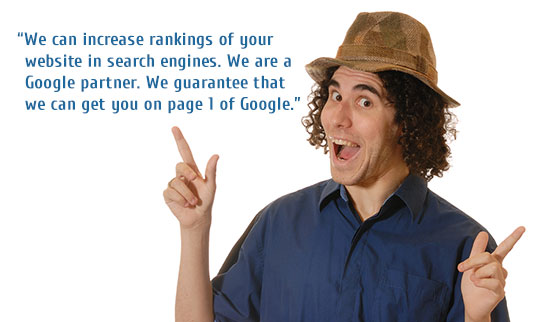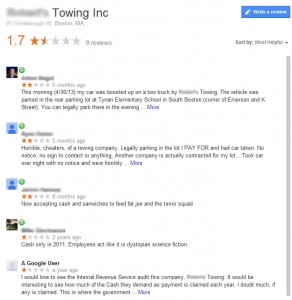Marketing is an investment in your business. Creating an inbound marketing plan and implementing the plan consistently can increase your visibility and strengthen your expert reputation. The following marketing mistakes can cause potential customers to question your expertise and move on to evaluating your competitor, hurting your small business and having a negative impact on your success.
Top 10 Marketing Mistakes
1. Not paying attention to details

How people perceive your business is based on what image you project regularly. Whether it is online or off, not reviewing your marketing materials for typos, grammatical errors or other issues that detract from the professionalism projected by your business sends a negative message. If you don’t care to project the best image for your business, what makes a potential client think you will deliver above and beyond when providing services to them? Always have another pair of eyes look at your materials before you publish, both online and in print.
2. Not understanding your customers needs
Do you really know what your potential customers need and want? Do you understand their challenges and can clearly describe how you are the best person to help them? Before you create your marketing plan, you need to define the characteristics of your ideal client, what they desperately need that you can fill and then provide the solution better than anyone else. The more you know about your customers and what keeps them up at night, the more effective your marketing efforts will be. Study your best customers and why they chose your business. Get to know your ideal client intimately so you can produce the results they are looking for.
3. Not staying true to your brand
Your brand is the promise you make to your customers and customers know immediately when there is a disconnect between what you have promised and what they receive. If your marketing activities deviate from the voice and reputation your brand has already established, you run the risk of confusing, disappointing or angering your customers and prospects. Ensure that all of your marketing stays true to your message and the promise of your brand.
4. Not adhering to email marketing best practices

How many unsolicited email newsletters do you get? When I get a real estate agent’s newsletter from Austin, Texas, I know I was added manually! The worse thing you can do to your brand’s reputation is to send unwanted emails “just because you met them at a networking event”.
One of the most powerful resources for marketing your business is your in-house email list full of customers and prospects that are interested in what you have. Use a reputable email service provider (MailChimp, Constant Contact, aWeber, etc) to build your list. Then use email marketing to keep you in touch with your prospects and customers. Ensure you understand email best practices and avoid critical mistakes that can get your small business blacklisted.
5. Believing in and hiring the SEO “expert” that will get your business on page 1 of Google

There’s no magic bullet. There’s no expert that can guarantee first page results. If it sounds too good to be true, most likely it is. Don’t be the victim of SEO and digital marketing scams that prey on small business owners.
Find someone you can trust and can educate you on what will work for your business. It takes time for your business to appear in the search engine results, but be patient and persistent. Implementing a solid content marketing and SEO strategy will have the greatest impact on your business.
6. Using your business name or having no picture of you in your social media personal profiles

People want to connect with you, the person, not your business. If you want to connect with me, please create personal profiles with your name and picture. I want to see who you are, understand what we may have in common and begin to build the “know, like and trust” relationship with you.
In addition to being frustrating, creating personal profiles with your business name and logo violate the terms of service across the board. Facebook has specific terms regarding personal profiles. LinkedIn specifically states to “Use your real name on your profile” and don’t “Upload a profile image that is not your likeness or a head-shot photo. Google+ has a specific policy for Profile Names. In order to participate in Google’s Authorship Program, you have to have a personal Google+ profile with a head shot profile picture.
Promote your business using Facebook Business Pages, Google+ Business Pages and LinkedIn Company Pages. They are designed to promote your products and services and allow those interested in your business, but maybe not you personally, to follow you.
7. Not seeking professional help when creating your brand identity
I’m all for small business owners being in control of their marketing efforts but when it comes to laying the foundation for a consistent online brand, you may want to think twice about creating your own brand, website or social media strategy without professional help.
It is far more cost-effective to create your brand identity right the first time and not waste time creating visibility only to have to start over because your brand isn’t working. Hiring professionals for those areas that require a unique skill – design, development and user experience – can help you get it right the first time.
8. Not reviewing your online reputation regularly
If your business is the type to garner online reviews, you must be aware of what is written about you. Once someone searches for your category and sees what has been published, you either will or won’t be contacted by the potential customer.
As a business owner, you need to do regular searches on your business name and address any issues you may find. Conduct multiple searches including web, images and blogs. If your online reviews look anything like the ones for the company below, you need help.
Marketing Mistakes – Online Reputation Management
No business will ever please 100% of their customers and unfortunately, when someone is unhappy, they are more likely to go online and write a bad review. Ask your happy customers to contribute a good review and provide them links to your preferred review pages. Get a few on Google (5 reviews displays the stars), Yelp, Better Business Bureau, Facebook if you have a local business page and any industry specific review site.
9. Spreading yourself too thin
Every business would love to be active on every single social network but for most of us, we have limited resources. Taking on too many social media platforms can backfire. You need to be present and engage with your followers and if you aren’t there when your fans are, you risk social media suicide. Select those social networks that are critical to connecting with your target audience and be there 100%. Once you are able to expand, then add more to your plan.
10. Believing that marketing is an expense, not an investment
If you have the mindset that everything you do in marketing is an expense, ready to cut when things aren’t working just right, then you are setting your business up to fail. Marketing is a process that requires a regular, consistent investment to increase your visibility and demonstrate your expertise. If you stop marketing to cut costs, your marketing efforts, and ultimately your business, will fail.
There are other marketing mistakes that occur within a particular marketing activity, such as poor landing pages, not using effective calls to action or lousy headlines, but these 10 mistakes can take your business out of the competition.
What marketing mistakes have you seen frequently that should be addressed?
Article source: http://masterful-marketing.com/marketing-mistakes-hurt-business/

